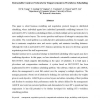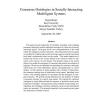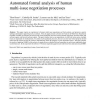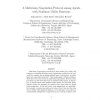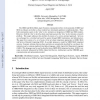112
click to vote
MAGS
2008
15 years 2 months ago
2008
This paper is about business modelling and negotiation protocol design in distributed scheduling, where individual agents have individual (potentially conflicting) interests. It i...
138
click to vote
MAGS
2008
15 years 2 months ago
2008
This paper presents approaches for building, managing, and evaluating consensus ontologies from the individual ontologies of a network of socially interacting agents. Each agent h...
122
click to vote
MAGS
2008
15 years 2 months ago
2008
Process calculi are mathematical tools used for modeling and analyzing the structure and behavior of reactive systems. One such calculus, called APi-calculus (an extension to Pi-ca...
116
click to vote
MAGS
2008
15 years 2 months ago
2008
Embodied Conversational Agents (ECAs) are computer generated life-like characters that interact with human users in face-to-face conversations. To achieve natural multi-modal conve...
120
click to vote
MAGS
2008
15 years 2 months ago
2008
This paper reports on experiments in (human) multi-issue negotiation and their analysis, and presents a generic software environment supporting such an analysis. First, the paper p...
122
click to vote
MAGS
2008
15 years 2 months ago
2008
This paper presents a decentralized model that allows self-interested agents to reach "win-win" agreements in a multi-attribute negotiation. The model is based on an alt...
121
click to vote
MAGS
2008
15 years 2 months ago
2008
Multi-Issue Negotiation protocols have been studied very widely and represent a promising field since most of negotiation problems in the realworld are complex ones including mult...
109
click to vote
MAGS
2008
15 years 2 months ago
2008
The GRID and MAS (Multi-Agent Systems) communities believe in the potential of GRID and MAS to enhance each other as these models have developed significant complementarities. Thu...
